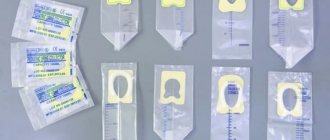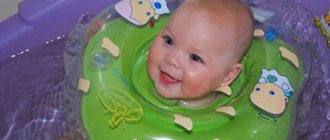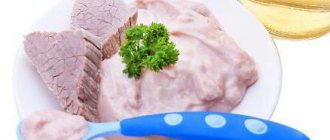Intestinal colic in a child is the most common problem that worries both the baby and his parents. Almost all parents who are faced with this problem for the first time are concerned with the question: how long does colic last for a child and what needs to be done to alleviate the baby’s condition? Colic occurs in infants.
This problem is common among newborns; every fifth child suffers from intestinal colic. Despite its painful symptoms, this condition does not affect the overall development of the baby. Colic occurs more often in boys and in those children who are born first in the family. This condition lasts for a child up to three or four months.
Women's online magazine for lovely ladies
- Health
— 16.10.2017 16.10.2017 2 27710
Quite recently, the meaning of your life was born - a baby to whom you are ready to give all of yourself without a trace. For two weeks he regularly sucks the breast with appetite every two and a half, three hours, then sleeps. You devote all your time only to him - there is not a minute left for yourself. You admire every moment spent together, enjoy every little thing. Now he looked at you, now he smiled in his sleep, now he raised his legs and arms... Joy is darkened only when the child begins to cry.
The cause of crying may be colic in the baby.
Preventive measures
- Take care of proper nutrition, exclude foods that cause increased gas formation.
- It is important to timely diagnose lactose intolerance and dysbiosis in order to prevent the occurrence of intestinal colic.
- Eliminate negative factors from the baby’s life, including remembering that the child feels his mother’s mood very keenly.
- Make sure that you are feeding your baby in the correct position, and you also need to know that you need to hold the bottle at an angle of 45 degrees.
- Before feeding, 15 minutes before feeding, you can lay the baby on his tummy; you need to be in this position for several minutes. After eating, you need to walk around with the child, holding him in an upright position.
- Make sure that the toddler's head is not lower than the body while eating.
If young parents follow all preventive measures and recommendations in advance, the diet of a nursing woman is balanced and does not include foods that stimulate colic in toddlers, then your baby will be more protected from the occurrence of such an unpleasant condition. But we should not forget that in the first months of life, almost all children experience such problems.
At what age does colic begin?
Two to three weeks after birth, for two to three months, babies are tormented by spasms and gas formation, which they are unable to cope with on their own. Newborns try to pull their legs towards their tummy, which after feeding becomes hard and very tense. Babies often lose gas, they often spit up, their daily routine is disrupted, their sleep and appetite are spoiled. These are the main symptoms of colic in newborns.
If your child suddenly develops a fever, colic has absolutely nothing to do with it - take him to the doctor immediately, the matter is much more serious.
Why does infant colic occur?
There are quite a few reasons. The baby’s gastrointestinal tract has just begun to adapt to human food and reacts instantly not only to any changes in the composition of mother’s milk.
– If the baby does not sufficiently grasp the mother’s breast during feeding, air enters the tummy along with the milk and begins to “walk” there, causing infant colic. Pay attention to whether the baby is sucking correctly - he should grasp the areola of the breast along with the nipple. Some babies suck too greedily, avidly, in which case air also gets into the intestines.
– When bottle-feeding, pay attention to the size of the hole in the nipple on the bottle. If it is too big, replace it, otherwise air will also enter the baby's tummy, causing colic.
– When overfeeding, the baby’s milk does not have time to digest and begins to ferment. Gases in the intestines cause colic in a newborn. This happens more often with artificial nutrition.
– What if the formula for a newborn was chosen incorrectly or had to be replaced urgently, or perhaps was not prepared according to the instructions? Or have you decided to switch to cow's milk? Then get ready for colic in a newborn.
– If the baby constantly lies on his back or tummy, colic also begins to bother him. After all, our body is adapted to walking upright. Hold your baby upright for a while after feeding. You will feel when the excess air comes out and the baby will feel better.
– Oddly enough, frequent crying can also cause colic. Because when crying a lot, the child also swallows a lot of air. Don't let the kids cry.
– The diet of a nursing mother is practically the main cause of infant colic. What a nursing mother eats must pass to the baby through breast milk. Take a close look at your menu.
Mother's menu against colic in a child
What foods that cause colic in a newborn should a nursing mother avoid?
These are carbonated drinks, including kvass, raw vegetables - peas, beans, corn, white cabbage, broccoli, grapes, plums, mayonnaise, ketchup, cucumbers, all smoked meats and pickles. Bread, buns, cakes and pastries also contribute to the appearance of colic in infants.
What is best for a nursing mother to eat so that the baby does not have colic? Foods that cause colic - mom's menu Any cereals, boiled soups, broths, lean boiled meat, boiled vegetables (potatoes, carrots, beets, tomatoes, sweet peppers, pumpkin), natural fermented milk products (sour cream, kefir, natural yogurt).
Young mothers, after reading this list, will most likely be indignant and will not want to go on such a diet. Everyone has their own choice - what is more important to you: the well-being of your baby, your restful sleep or a piece of cake?
Try cooking for yourself separately. You will say that you don’t have enough time for anything, and now you have to cook separately! But think, this will save you and your baby from many problems.
The baby has colic, what does the mother have?
What products are recommended for a nursing woman if her baby is diagnosed with colic:
- Bread with bran.
- Galette cookies.
- Inconvenient crackers.
- Green tea.
- Fried or stewed vegetables and fruits.
- Lean meat and fish.
- Dairy and fermented milk products (with low fat content).
- Vegetable oil, unrefined.
- Compotes and decoctions of dried fruits.
- Porridge.
You should not eat the following foods:
- Soda.
- Legumes.
- Cabbage, cucumbers, especially fresh ones.
- Nuts.
- Raw onions, tomatoes.
- Drinks containing caffeine.
- Whole cow's milk.
- Fried food, pickles, smoked meats, spicy seasonings.
Drugs against infant colic
Some medications help in the fight against colic. There are three types of such drugs.
These are drugs based on simethicone, probiotics, enzyme and herbal preparations.
Simethicone is a substance that fights the formation of gas in the intestines of newborns, providing pain relief and eliminating the symptoms of colic in infants. This product is not absorbed into the blood, it has no contraindications or side effects, so it is completely harmless even for infants.
Simethicone is part of Espumisan. Where, besides it, only natural components are present. "Espumizan" is used from the birth of the baby.
Along with it, Sub-Simplex is good, which also includes simethicone and natural herbs against colic in infants.
Bobotik drops also contain simethicone, but they are taken from the age of 28 days. Bobotik for colic in newborns Probiotics are based on lacto- and bifidobacteria. They help the intestines of a newborn, who does not yet have enough bacteria to process food.
Products with probiotics: “Bifiform”, “Bifidumbacterin”, “Acepol”. They are completely harmless to the baby, but still, let the doctor prescribe them for you, he will find a more suitable probiotic for the baby.
Enzyme products
Their action is based on the fact that they help to absorb breast milk or formula, that is, break them down. These products include: “Creon”, “Mezim”, “Lactazar”. The components of the latter break down milk sugar and are indicated for babies with lactase deficiency.
Herbal medicines are based on traditional medicine
An infusion of ordinary dill or chamomile seeds, as well as cumin and anise, helps against infant colic. You can prepare this infusion yourself.
Pharmacies also have ready-made herbal medicines. For example "Bebinos". It contains completely safe chamomile, coriander and fennel, which relieve the symptoms of colic.
Baby Calm drops contain mint, anise and fennel. They relieve spasms in babies very well, soothe the tummy, and relieve gas.
Colic in a child's stomach
What exactly does this disease mean? Colic is a painful sensation that comes in attacks. In general, they arise due to increased gas formation in the baby’s intestines. At this moment, the child may cry very much, twitch his legs, and press them to his tummy. Most often, colic occurs in children in the first three months of life, because their digestive system is not yet fully formed.
Colic sets in, the child does not eat - this is not surprising. My son was in great pain and when he started to suckle, he cried a lot and twitched his legs. During the feeding process, my son’s condition only worsened, so it is not surprising that children refuse to eat during colic. The doctor prescribed us to take Espumisan, it significantly alleviated the baby’s condition, although it did not completely relieve colic.
The main thing is to understand that colic in the abdomen is not a pathology, and it does not require special treatment; to a greater extent, it is a physiological process. Most often, colic is observed in a one-month-old baby, and practically stops by the age of three months (if the cause is physiology).
What to do if colic lasts too long?
Observe your baby after three months of age. If he continues to scream after feeding, press his legs to his tummy and nothing helps him, be sure to call the pediatrician. Let him order a detailed examination. When the cause of colic is found, the doctor will select the appropriate treatment. Maybe it will be special gymnastics or massage, or maybe drug treatment. Also, most likely, you will have to reconsider the nutrition of the nursing mother or the quality of the formula if the baby is bottle-fed.
Together with your pediatrician, you need to step by step consider the lifestyle of both you and your baby. And find a joint solution to this problem.
Be sure to call a doctor if your baby cries continuously for several hours in a row, and you cannot calm him down, and no remedy helps.
Loss of appetite, high fever, and abdominal pain are more serious symptoms. The cause may be some kind of infection. In this case, also call a doctor immediately.
Tummy problems can arise at any age - first due to colic, then when teeth are cut, then when switching to complementary foods. Do not hesitate to consult a doctor in every case - it will be better for your baby, and therefore peace of mind for you.
Often, expectant parents, while expecting a baby, worry about how to tell if their baby has colic. Having read heartbreaking stories on forums and listened to stories from experienced parents, expectant mothers and fathers worry that they will not be able to recognize these same colics. Naturally, tummy pain in newborn babies is not difficult to identify.
If mom and dad take care of the child, then a month after his birth they will be puzzled by only one question: when does colic in newborns go away? This is not strange, because pain in the tummy is so exhausting for both the baby and mom and dad that everyone eagerly awaits its end.
General recommendations for preventing attacks
To begin with, doctors advise not to treat colic, but to prevent its occurrence:
- It is necessary to ensure that the baby grasps the nipple or pacifier correctly during feeding.
- It is important to monitor the amount of milk your baby consumes.
- After feeding, the baby needs to be held upright so that the air that the baby has swallowed comes out.
- Wear it vertically more often.
- Do a light tummy massage about half an hour after eating. Circular movements in a clockwise direction can improve the removal of gases.
- Be sure to do gymnastics with the baby, during which you gently press the legs to the tummy.
- Follow a diet that will prevent increased gas formation in your child.
- If the baby is bottle-fed, the bottle nipple should be equipped with a special hole for air removal.
As a rule, everyone receives recommendations on nutrition for a nursing mother in the maternity hospital, but there is a lot of advice, and it can be difficult to remember them. Please note that when breastfeeding you should not eat rye bread or whole wheat bread, milk, legumes, raw and canned vegetables and fruits. It is important to reduce the amount of fiber in the diet until the colic stops.
Ways to eliminate spasms
First of all, doctors and grandmothers advise, when colic occurs, to place the baby on his stomach on a warm diaper. This will relax the baby and he will be able to get rid of gas. But recently, it is increasingly recommended not to neglect the achievements of pharmaceuticals and to give drugs for colic in newborns that are safe and effective.
Simethicone, the main active ingredient in such medications, helps relieve spasms. It converts gas into liquid, which relieves pain and the child feels much better. Doctors may also prescribe probiotics and enzymes, depending on the presence of other intestinal problems.
The list of remedies for colic in newborns is known to almost all experienced parents:
- simethicone directly;
- subsimplex;
- espumizan;
- bobotik;
- infacol;
- disflatil, etc.
Their essence boils down to one thing, the differences lie only in the excipients and fillers. These are mainly suspensions, drops or syrups that are quite easy to give to babies.
If it is necessary to treat dysbiosis, the baby is prescribed probiotics: Acepol, Bifiform, Bifidumbacterin, Linex, Hilak Forte.
Enzymes such as mezim, creon, lactazar also help improve digestion and eliminate spasms in the intestines. But such drugs can only be prescribed by a doctor.
Traditional medicine in the fight against colic
You shouldn’t give up folk recipes: at all times, the first remedy for colic was dill water. This is not a panacea, but it is not a cure either, so it usually has no restrictions on its use. It is recommended to use not only fennel, but also mint, anise, and chamomile to prepare such a preparation. All this is brewed and given to the baby.
Ready-made herbal medicines are also sold in pharmacies. These include Bebinos, Bebicalm, Plantex. Pharmacists also offer herbal teas for babies. If taking medications is clearly indicated in the instructions, then teas and decoctions should be given approximately 1 teaspoon three times a day.
Parents' opinions regarding drugs and medicines differ, because some consider them harmful and give only dill water, while others consider them to be indispensable helpers that alleviate the baby's condition. Perhaps, only one thing is important - to be patient and help the baby get through this difficult period.
From about three months of age, the attacks stop. Sometimes they last up to 4 months or longer if the mother’s nutrition is not adjusted or there are other problems with the baby’s gastrointestinal tract. White cabbage, grapes and other foods can also provoke spasms in older people. Therefore, remain attentive even if it seems to you that the colic problem has already been eliminated.
What does abdominal pain indicate?
If your baby has colic, this does not mean that he is sick. It’s just that the child’s body adapts to life outside the mother’s tummy. Parents often ask in advance when colic begins in newborns in order to be prepared for this problem. But it is impossible to prepare for this. For all children, this process occurs individually, and treatment methods need to be selected only by trial and error.
How to recognize colic?
Experienced parents will unanimously say that colic cannot be confused with anything else: the child’s prolonged, hysterical crying will remain in the memory of mom and dad for a long time. To recognize colic and distinguish it from other pains, you do not need to undergo laboratory tests or examinations. But consulting a pediatrician won't hurt. A qualified specialist will help parents figure out how to recognize colic and what symptoms they should pay attention to first.
Most often, colic can begin after feeding or after some time. As a rule, this occurs at night, but excruciating pain can cause discomfort to the child at any time of the day.
If a baby has a stomach ache, he begins to cry long and hard. Often this crying cannot be stopped. It is difficult to distract a child with anything; he is capricious. When the mother tries to feed him, he may first convulsively grab the nipple when breastfeeding (or the nipple when artificial), then sharply push it away and start crying again. If the mother touches the baby's tummy, it will be hard and slightly inflated.
The duration of attacks ranges from 30 minutes to several hours. During this time, not only the child gets tired, but also the parents. It is necessary to take a set of measures that will help the baby endure this period less restlessly. Mothers should do special gymnastics, apply a warm diaper to their tummy, and during attacks, pick them up and hold them close. You also need to resort to medication. Special syrups and suspensions will help slightly reduce the pain. But you shouldn’t expect that medications will completely eliminate the problem. They can only slightly alleviate the child’s condition while the attack lasts, but in one or several doses they are not able to adapt the gastrointestinal tract to new food.
It is best to ask your pediatrician in advance during a routine examination to tell you how colic manifests itself in newborns and what needs to be done to make the baby feel better. Then parents will feel more confident and will be able to help their child.
Until how many months does colic last in newborn boys - We treat the gastrointestinal tract
Colic in newborns is common. The first symptoms begin to appear already at 2-3 weeks of the baby’s life. They are observed in almost all babies; this is a normal phenomenon. Parents should know basic tips that will help alleviate the child's condition.
What is colic in a newborn?
Colic in infants occurs due to a change in intestinal function from the intrauterine rhythm to complete digestion of food. Doctors say that this condition occurs regardless of the time of day and occurs individually in each child.
On average, an attack can last from 15 minutes to two hours. At the same time, the baby may scream and not react in any way to attempts at consolation.
The newborn has an immature autonomic nervous system. It matures within 3-4 months, during the period when colic begins. During ripening, intestinal motility may be impaired.
Spasms occur, which provoke attacks of pain in the baby. This phenomenon is also observed due to a lack of intestinal hormones.
Closer to 4-6 months, their number stabilizes and the digestive system works properly.
Reasons for their appearance
There are a large number of reasons that can cause colic in a baby. Often the onset of colic coincides with the period when the effects of maternal hormones that the baby received during the prenatal period ceased. Against this background, skin rashes may occur.
One of the most common reasons is improper attachment to the breast. While eating, the child swallows a large amount of air, which provokes the disorder.
This condition also occurs when the child is fed strictly on time. Before the next meal, he feels very hungry and as a result eats too quickly and swallows a lot of air.
Other causes:
- stress,
- allergic reaction,
- disorders of the nervous system,
- problems with the microflora of the stomach.
Increased gas formation may occur due to poor nutrition of the mother. It should be remembered that everything that enters the mother's stomach is broken down into basic elements and passes into breast milk.
Colic can occur if the baby is not taught proper breathing. When crying or overexcited, the baby swallows a lot of air. It enters the intestines and bursts its walls, thereby causing discomfort.
When does colic begin in a newborn?
In most cases, colic begins at 3 months. Sometimes the first symptoms of this condition can occur within 2-3 weeks after birth. During this period, the composition of the intestinal microflora is as unstable as possible, and this negatively affects the baby’s well-being.
When does colic go away in newborns?
Colic is not a disease. Their period ends differently for everyone. In most cases, all negative symptoms disappear by 4 months.
First aid for a baby
There are a number of simple techniques that will help alleviate the child’s condition. The following procedures will help your baby:
- rhythmic swaying,
- taking a warm bath,
- abdominal massage,
- sounds of singing,
- laying on the stomach.
Rocking is good for calming children. You can simply hold the baby in your arms or use a special automatic swing for newborns. Rocking from side to side makes babies excited, while rocking from top to bottom on the contrary calms them down. If the child begins to cry even more, then this method should be abandoned.
A warm bath will only help if your baby loves bathing. Aromatherapy helps a lot. You can add some herbs to the bath with a calming effect. For example, mint or lemon balm. However, before using herbs, you should consult a doctor, as they can provoke an allergic reaction and have contraindications.
Abdominal massage should be performed with your hand in a clockwise direction. All movements should be soft and gentle. To relieve pain, you can place a sheet heated with an iron or radiator on your stomach. It shouldn't be too hot.
Some children calm down in the presence of certain sounds. It could be mom singing, the sound of rain or the hum of a fan. Experimentally, you should determine which sound is most pleasant to the baby.
To relieve pain and calm the baby, he can be placed on his stomach across the mother's knees or on her bare stomach. At the same time, you can easily stroke the baby's back. Placing your newborn upright on your shoulder creates additional pressure, which will help expel gases.
Colic medications
To relieve pain, you can use special medications. This medicine is selected in stages. Initially, the doctor prescribes the use of herbal carminative drugs. If they are not suitable, simethicone is prescribed. At the last stage, a specialist may recommend taking enzyme medications.
Before prescribing medication, the mother’s diet is corrected if the child is breastfed. If necessary, mixtures for mixed or artificial feeding are selected. If such measures do not bring the desired result, then medication is prescribed.
Effective drugs:
- Bobotik,
- Sub Simplex,
- Espumisan L.
Bobotik can be used from the 28th day of the baby’s life. Sab Simplex is approved from birth, and Espumisan L is intended for infants.
Doctor Komarovsky about colic
Dr. Komarovsky claims that the mother’s diet has virtually no effect on the occurrence of colic. At the same time, he recommends selecting food products for a woman during breastfeeding with caution.
Colic in newborns is a natural phenomenon. Regardless of whether medications are taken or not, they go away on their own after a certain time. Medicines only help relieve pain.
Advice from Dr. Komarovsky:
- To swaddle your baby, you should use large, thin diapers.
- Calm, monotonous music has a positive effect on the child's condition. Children respond well to the sound of a fan or other quiet sounds.
- If a newborn has an attack of colic, you should calmly and gently rock him to sleep.
- The intervals between meals should be at least 2 hours. The child should not be overfed.
- A pacifier will help soothe your baby.
Dr. Komarovsky advises young parents to take care of their nerves. During the period of colic, the baby will cry and be capricious a lot. In order not to bring your condition to a nervous breakdown, you should alternate with family members and rest.
Intestinal colic in newborns, normal condition. The baby feels severe pain, so he begins to act up. To improve the child’s well-being, you can use special medications, but only after consulting a doctor.
Source: https://lechimzhkt.ru/do-skolki-mesyaczev-koliki-u-novorozhdennyh-malchikov.html











